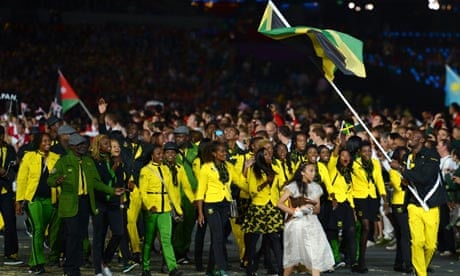There's a strange sense of deja vu in Jamaica at the moment. Bunting adorns buildings. Roadside vendors sell the national flag. Patriotic songs are on everyone's lips, and breasts swell with pride. Politicians are enjoying a holiday from scrutiny as citizens tune in to Usain Bolt and the gang chasing Olympic glory in London.
It's 6 August 1962 all over again. Except for the annual murder rate of more than 1,000. And the trillion-dollar debt. Fifty years since Jamaica took charge of its own affairs, it's possible to conclude that the independence experiment has been botched.
Even the former prime minister Edward Seaga has given this damning judgment: "Independence has not failed Jamaica; it is Jamaicans who have failed independence, and it is Jamaicans who must reset the course to return it to its auspicious start."
Of course, being Jamaican is cool. Cliches of coconut trees, Rastafarians and sun-kissed beaches abound. In music and culture there are big names like Bob Marley, Peter Tosh, Millie Small and Jimmy Cliff. And in sport, athletic superstars Usain Bolt, Merlene Ottey and Veronica Campbell-Brown have dominated the headlines, along with cricketer Chris Gayle and retired bowlers Michael Holding and Courtney Walsh.
But Jamaica's debt-to-GDP ratio of 140% ranks slightly worse than that of Greece. And annual economic growth has crawled along at less than 1% on average over the past four decades; in the decade after independence, growth was 6%.
Successive administrations have failed to educate and train the population for the future. We need more engineers and pathologists, but churn out too many cabbies and cosmetologists. We invest billions of dollars in a creaking high school system that produces students who can neither go to university nor secure decent employment beyond muscle work or house-cleaning.
Jamaica's biggest handicap in its 50 years has been politicians' inability to generate a unified vision. Both the Jamaica Labour party and the ruling People's National party have, in their periods in power, been too busy operating the treasury as a trough for supporters.
The independence development plan of the 1960s has been forgotten, while Vision 2030, an elaborate plan to gain first world status in the next 18 years, has not taken root in the minds of ordinary people.
The key to Jamaica living up to its potential is retaining its best talent. Studies have shown that up to 80% of university graduates migrate to the greener pastures of the US, the UK, the Cayman Islands and Bermuda, where they can earn five times or more than they do in Jamaica. And even though US$2bn was sent back to Jamaica by expats in 2011, much of that money is spent on family budgets buying food, clothes and gadgets imported from the US, China or neighbouring Trinidad.
But not everything post-1962 has been bad. Social inequity was far more entrenched then than in modern Jamaica. Literacy, though still not universal, was far lower at handover, and the educational infrastructure was not meaningfully developed. The job market was infected with class and colour prejudice in the first decade of independence, and those barriers have largely tumbled. The road network was nothing compared to the current cross-island web of highways.
The country's state at independence was part of the legacy of plantation slavery and colonial underdevelopment – squeezing out as much as possible with as little investment possible in social and physical infrastructure. But Jamaicans still can't blame it all on the Brits. Comparisons with other former British colonies such as Barbados and the Bahamas, and remaining colonies such as Cayman and Bermuda, show we have lagged behind in economic growth and development.
Instead of taking hard decisions to transform Jamaica by disavowing the decades-old political cronyism, our prime ministers have found it easier to rail at Britain for 300 years of slavery and colonialism. So we want to remove the Queen as head of state. And scrap the UK-based privy council for a Caribbean court of justice.
Rail, we should. But these symbolic moves mask the need for a tectonic shift in socioeconomic indicators. What Jamaica requires is an unravelling of government bureaucracy that stifles business and encourages corruption; tax reform to get hundreds of thousands of freeloaders to pay up and support the state; a bold entrepreneurial class; and a well-trained workforce that will boost chronic low productivity.
Returning with a booty of gold, silver and bronze from the London Games will fuel national euphoria, but Jamaica must excel outside the Olympic Stadium to really fulfil its independence dream.
